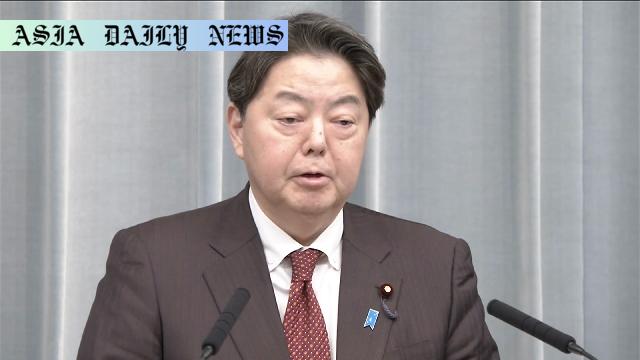Iran Nuclear Development: Japan emphasizes the importance of dialogue as the US strikes highlight its determination to limit nuclear risks globally.

Escalation of Nuclear Tensions in Iran
The US has conducted strategic airstrikes on Iran’s nuclear facilities, sending a strong message regarding its unwavering position against Tehran’s nuclear development. This decisive action underscores the Biden administration’s commitment to preventing Iran from acquiring nuclear weapons, which could destabilize global security, particularly in the volatile Middle East. The strikes come amidst a backdrop of strained negotiations between Iran and the West, with Washington’s frustration mounting over stalled progress in diplomatic talks.
Japan’s Call for Diplomacy and Peace
Japan, a nation heavily reliant on Middle Eastern stability for its energy imports, has expressed strong concerns regarding recent developments. Chief Cabinet Secretary Hayashi Yoshimasa urged the international community to prioritize reopening dialogue with Iran to prevent the region from sliding into deeper turmoil. Hayashi emphasized that peace and stability in the Middle East are critical for Japan, which relies on diplomatic multilateralism to safeguard its security and energy needs. Tokyo is actively working towards cooperative solutions while balancing its alliances with both the US and Middle Eastern nations.
Evacuations of Japanese Nationals
Amidst escalating tensions, Japan has successfully evacuated its citizens from the region to ensure their safety. 87 Japanese nationals were evacuated by land from Iran, while an additional 21 individuals were moved from Israel due to regional unrest. Two aircraft from the Japan Air Self-Defense Force are on standby in Djibouti, ready to evacuate more Japanese citizens should airports reopen for safe travel. These swift actions reflect Japan’s proactive approach in mitigating risks to its people during international crises.
US Strikes: A Signal to Iran
The US strikes on Iran’s nuclear facilities are not merely physical acts of war; they serve as a critical signal to Tehran about Washington’s zero-tolerance stance on nuclear proliferation. While these actions are intended to deter further development of nuclear capabilities in Iran, they also highlight the complexity of managing diplomatic relations. Despite these strikes, the US has reiterated its commitment to dialogue, hoping to bring Iran back to the negotiation table for a peaceful resolution to nuclear concerns.
Japan’s Diplomatic Role
Given the increasing stakes in Middle Eastern geopolitics, Japan has emerged as a potential mediator. As a country valued for its neutrality and diplomatic finesse, Japan hopes to encourage conversations between conflicting sides. Its reliance on Middle Eastern oil underscores the high stakes involved in the matter. Tokyo’s approach reflects a dual commitment to supporting the US in its pursuit of regional security while advocating for lasting solutions through cooperative diplomacy.
The Global Implications of Escalation
The potential for Iran to develop nuclear weapons poses significant risks to global security, extending far beyond the Middle East. Countries worldwide, including Japan, view this development with utmost gravity. The interconnectedness of global economies and energy markets means that any escalation could ripple across borders, affecting not just the region but the world economy. By choosing to act decisively, the US has both contained an immediate threat and also raised questions about the future trajectory of diplomatic, military, and economic relations globally.
In conclusion, the recent US strikes on Iran’s nuclear facilities symbolize a concerted effort to uphold a global red line against nuclear proliferation. Japan’s support for peace efforts through dialogue and its active role in ensuring the safety of its citizens are indicative of its balanced geopolitical approach. As the world watches this crisis unfold, it remains imperative for nations to pursue diplomatic solutions that underscore shared interests in global peace and stability.
Commentary
US Strikes and Japan’s Response: A Balance of Power and Diplomacy
The recent US strikes on Iran’s nuclear facilities have reignited discussions on military interventions and their implications for global diplomacy. The show of strength by the United States underscores its resolve in preventing the proliferation of nuclear weapons, particularly in a region as sensitive as the Middle East. However, while such decisive action may deter further nuclear ambitions in the short term, it risks exacerbating tensions in the region and complicating the path to peaceful negotiations.
Japan’s Strategic Position
Japan’s response to these developments reflects its unique position in global politics. As a nation heavily dependent on Middle Eastern oil for its energy needs, Japan has a vested interest in maintaining stability in the region. Chief Cabinet Secretary Hayashi Yoshimasa’s call for renewed dialogue highlights Japan’s preference for diplomacy over conflict. This approach not only aligns with Japan’s pacifist constitution but also reinforces its reputation as a neutral and reliable mediator in international disputes.
Evacuations and Humanitarian Efforts
The evacuation of Japanese nationals from Iran and Israel serves as a reminder of the human cost of geopolitical tensions. Japan’s swift action to ensure the safety of its citizens demonstrates the government’s commitment to protecting its people amidst uncertainty. However, the readiness of Self-Defense Force aircraft in Djibouti also underscores the precariousness of the situation, signaling that continued instability could necessitate further large-scale evacuations and humanitarian efforts.
The Broader Implications
As countries grapple with the challenges posed by Iran’s nuclear ambitions, the broader implications of the US strikes cannot be ignored. While military action may provide a temporary solution, it is not a substitute for sustained diplomatic engagement. The international community, including nations like Japan, must work collaboratively to address the root causes of such conflicts and create frameworks for lasting peace. In doing so, they not only ensure regional stability but also uphold the principles of global security and cooperation.
In conclusion, the events surrounding Iran’s nuclear program and the US response highlight the complexity of modern geopolitics. Japan’s role as a proponent of dialogue and peace underscores the importance of diplomacy in resolving international disputes. As the situation continues to evolve, it remains crucial for all stakeholders to prioritize collaborative solutions that address both immediate threats and long-term challenges.


